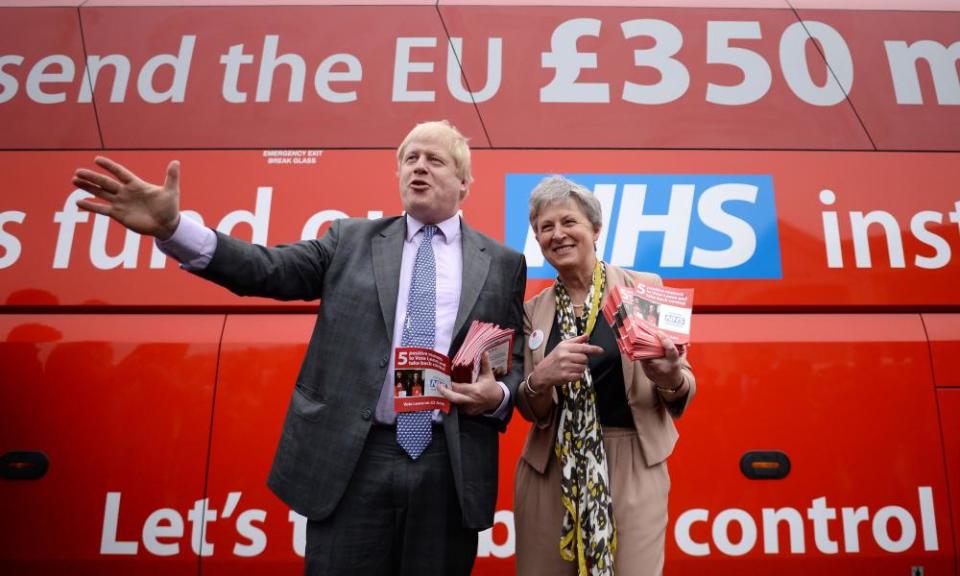Leave campaign's £350m claim was too low, says Boris Johnson

Boris Johnson has ratcheted-up his defence of Vote Leave’s infamous assertion on the side of their bus that Britain sends £350m a week to the EU by saying the group could have used a much higher figure.
The foreign secretary said the UK’s weekly gross contribution would rise to £438m by the end of a post-Brexit transition period and insisted leave campaigners were right to pledge extra cash to the NHS.
“There was an error on the side of the bus. We grossly underestimated the sum over which we would be able to take back control,” said Johnson, in an exclusive interview with the Guardian.
Though he conceded that the leave campaign had used a gross figure, he said about half the total could be ploughed into public services.
“As and when the cash becomes available – and it won’t until we leave – the NHS should be at the very top of the list,” said Johnson, on a day that the Guardian revealed that students were being drafted in to help plug NHS gaps opening up in the winter crisis.

In the face of rising pressures on doctors, nurses and other health workers, Johnson said he had sympathy with the call of Theresa May’s former chief of staff, Nick Timothy, in favour of a cross-party royal commission into health and social care funding.
Johnson said NHS funding was a “huge priority for the British people” and something that ought to be looked at.
He said the British public were not “gagging” for a second referendum and insisted he was against such a move. But Johnson, who is preparing to deliver a speech on the liberal case for Brexit, insisted that if there was another vote, it would deliver another victory to leave.
In the interview, the foreign secretary also:
Accused Jeremy Corbyn of “insanity” for downplaying the importance of Britain’s relationship with the US.
Warned ahead of a Vancouver summit on North Korea that the threat from Kim Jong-un was the kind “the world has not known since the dawn of the atomic age”.
Said a key priority for him as foreign secretary would be driving up girls’ education around the world, which he described as a “universal spanner” to tackle population growth and radicalisation.
However, his decision to double-down on Vote Leave’s claim of a Brexit windfall could irritate Downing Street and is likely to provoke some remain supporters who consider the use of the £350m figure to be misleading. They believe it suggested that all the money would eventually go to Britain’s hospitals.
The shadow Brexit minister, Matthew Pennycook, said Johnson had no shame. “He spent the entire referendum campaign standing in front of his red bus with a bogus claim on the side, and now he is saying the figure should be higher. The public really do deserve better from the foreign secretary.”
But Johnson argued that the UK’s EU contribution was already up to £362m per week for 2017-18 and would rise annually to £410m, £431m, and then to £438m by 2020-21 – “theoretically the last year of the transition period”.
Johnson argued that it was reasonable to use the gross figure because the UK government would “take back control” of the full amount. Moreover, he said the net figure was also rising, with around half of the total likely to be available to plough into British priorities in the future.
Official forecasts of the UK’s future contributions to the EU have risen since the 2016 referendum campaign, in part because sterling is significantly weaker against the euro.
Asked about the possibility of another national vote after Nigel Farage raised the spectre of a second referendum, Johnson said he felt it was a bad idea.
“We’ve just had one, and I think it went pretty well but it was something that caused an awful lot of heartache and soul-searching, and everybody went through the wringer on it,” he said. “I’m not convinced that the public is absolutely gagging for another Brexit referendum.”
He denied the suggestion that he fears Brexit might not happen, although he admitted that the history of the EU was to try to get countries “back into line” if they tried to vote against integration.
“I genuinely don’t think that will happen in this case. I think that something very profound has happened in the UK,” he said. “And I think actually were there to be – I don’t think there should be a second referendum – I think the result would be pretty much the same, or the result would be more heavy for leave, I really do.”
Johnson insisted he was an internationalist, who believed in Britain’s unique global profile. “We can continue to be European, we can continue to be friends and partners with our counterparts across the Channel,” he said, arguing that young people and academics most hurt by Brexit could be persuaded in the long run.
Johnson, who will take part in cabinet committee discussions this week into the “Brexit end-state” the government would seek, made clear that a Norway-style option would fail to make the most of the leave vote. He argued that was because it would limit the ability to diverge from the EU in regulation terms and so restrict the possibility of new trading relationships.

 Yahoo News
Yahoo News 